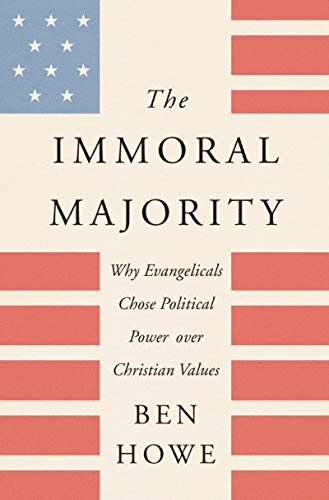The Immoral Majority
Why Evangelicals Chose Political Power over Christian Values
Ben Howe
BOOK REVIEW

The landscape of American politics is a battlefield, and amidst the chaos lies an unsettling truth that Ben Howe unveils in his provocative book, The Immoral Majority: Why Evangelicals Chose Political Power over Christian Values. This astounding piece of literary work throws down the gauntlet-a bold challenge to the long-held perceptions about the evangelical movement in the United States. It's not just a book; it's a clarion call to awaken your conscience and confront the stark realities woven into our social fabric.
Howe's exploration isn't merely academic; it delves into the very marrow of American identity, unraveling how a group that once championed humility and moral integrity now finds itself shackled to political expediency. This transformation raises potent questions: What happened to the values that were meant to guide these communities? How did the sacred intertwine with the sordid lust for power? These inquiries dig deep, pricking the collective conscience of a nation that has shifted on the moral compass, leading many to question their faith.
From the opening chapters, Howe takes you on a whirlwind journey through history, dissecting the evangelical alignment with political power that emerged prominently in the last few decades. His incisive analysis pulls no punches. It's a journey populated by startling revelations and chilling parallels to contemporary events that are as relevant today as they were when the author first penned these thoughts. The book shakes the foundations of complacency, demanding that you reconsider what you thought you knew about ethics, faith, and the powerful forces reshaping them.
Readers have expressed visceral reactions to Howe's narrative. Some laud his courage to critique the very community he identifies with, while others defend this so-called "immoral majority," arguing that political involvement is not only a right but a responsibility. Yet, the chorus of dissent is hard to ignore; critiques echo across social media and book clubs, sparking debates that leave no side unscathed. Why? Because Howe isn't just throwing stones; he's armed with historic insights and a deep understanding of cultural relevance that many find compelling, if not entirely agreeable.
The emotional charge of The Immoral Majority is palpable. As you turn each page, you confront the spectrum of feelings-anger, disappointment, empathy, and even hope. Howe delves into heart-wrenching stories of individuals caught in the crossfire of this moral battle, reminding you that faith isn't meant to align with power but to challenge it. One deeply impactful narrative highlights a pastor's struggle to reconcile his beliefs with the political rhetoric evangelicals often embrace. Such anecdotes serve as emotional anchors, drawing you into the turmoil and urging you to dig deeper.
Moreover, Howe's critique serves as a mirror reflecting our societal roles-who are we becoming? As you grapple with the discomfort of these questions, your mind races through the implications: the moral compromises, the floundering principles, and the societal fractures that emerge when power takes precedence over faith. Your senses heighten, and the battle between individual belief and collective action weaves a complex tapestry that is both fascinating and disturbing.
The historical context surrounding The Immoral Majority enriches the reading experience. Howe meticulously traces pivotal moments from the past to expose the threads binding the evangelical shift to broader political movements. It's a sobering reminder that these disturbingly cycles trace back further than you might consider. Thus, the book doesn't just catalog opinions; it informs an urgent narrative that feels compelling in the face of today's contentious political climate.
As the reviews stack up, the polarization becomes evident. Some argue that Howe's perspective is skewed, while others seem to find solace and validation within his words. Yet one cannot escape the reality that this book is serving a greater purpose-it's igniting discourse, prompting reflection, and awakening a generation to the dangers of losing sight of core values.
This is no ordinary book; it's a tempest of thought provoking insight that implores you to confront not only the hypocrisy that infests political discourse but also the very nature of personal belief. The Immoral Majority isn't simply an exposition of evangelicalism's relationship with politics; it's a challenge to reweave the threads of morality into the fabric of our lives.
If you're willing to engage with these painful, yet profound questions, you will emerge from this reading experience transformed, if not entirely resolved. Howe's work won't just make you think-it will dare you to act, compelling you not only to understand but to redefine your relationship with faith and power. Are you ready for the challenge? ✨️
📖 The Immoral Majority: Why Evangelicals Chose Political Power over Christian Values
✍ by Ben Howe
🧾 296 pages
2019
#immoral #majority #evangelicals #chose #political #power #over #christian #values #howe #BenHowe